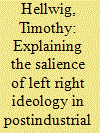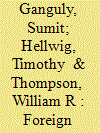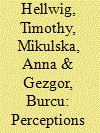| Srl | Item |
| 1 |
ID:
084557


|
|
|
| 2 |
ID:
153550


|
|
|
|
|
| Summary/Abstract |
Foreign policy belief systems have received much attention. Yet nearly all work examines attitudes in western democracies, chiefly the United States. The current security environment requires that we ask whether the foreign policy views of individuals in other nations—particularly regional powers—are similar in structure to those found in the US case. This article does so for the Indian case. Drawing on studies of US opinion, we develop a set of claims and test them on an original data set on Indian elites. We make four contributions. First, we show that Wittkopf’s framework applies to the Indian case. Second, we demonstrate how this framework can be made more generally applicable by revising its emphases on different types of internationalism and on rethinking the meaning of isolationist preferences. Third, we place the Indian case in comparative perspective. And last, we model the dimensions of Indian attitudes as a function of domestic ideology. Results of our analyses provide insights into the structure of foreign policy belief systems outside the Global North.
|
|
|
|
|
|
|
|
|
|
|
|
|
|
|
|
| 3 |
ID:
099197


|
|
|
| 4 |
ID:
136615


|
|
|
|
|
| Summary/Abstract |
Conventional wisdom has it that political parties have incentives to respond to public opinion. It is also conventional wisdom that in open economies, policymakers must also “respond” to markets. Research on representation has provided ample evidence in support of the first claim. Research on the political economy of globalization has not, however, provided evidence for the second. This article examines the effects of globalization on how parties respond to voters. We argue that while elections motivate parties to respond to public sentiment, economic interdependence distracts political elites from their electorates and toward market actors, reducing party responsiveness to the mean voter. Evidence from a pair of distinct data sources spanning elections in twenty advanced capitalist democracies from the 1970s to 2010 shows that while parties have incentives to respond to left-right shifts in the mean voter position, they only do so when the national economy is sufficiently sheltered from the world economy. These findings have implications for party strategies, for representation, and for the broader effects of market integration.
|
|
|
|
|
|
|
|
|
|
|
|
|
|
|
|